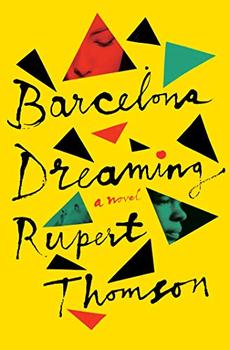Summary | Excerpt | Reviews | Beyond the Book | Readalikes | Genres & Themes | Author Bio

I moved on, into the car park. The walls were dark blue to waist height and cream above, and the air smelled of spilled oil.
"Hello?" I called out. "Is anybody there?"
The stillness of the cars seemed temporary, as if they were living things, holding their breath. Some fifty yards away, there was another slope that dipped down to a lower level. I doubted I would have heard the crying if it had come from there.
Then, just as I was thinking of turning back, I saw him. He was bent over a Range Rover, his forearms resting on the bonnet, his face concealed. He looked young. Nineteen, perhaps. Or twenty. When I stopped nearby, he lifted his head and looked at me. His face was wet, though he was no longer crying.
I spoke to him in Spanish. "Are you all right?" Then I said the same thing again, in English.
Wiping his eyes on the inside of his wrist, he glanced beyond me warily, as if he suspected I might not be alone. He was wearing a dark-red short-sleeved shirt and a pair of jeans that looked new. Something told me he had made an effort that evening. He had dressed up to go out.
"Do you need help?" I asked.
He looked at me and spoke in French, his voice subdued, no more than a murmur. I had studied French at school, but it wasn't a language I knew well. I had only a few basic phrases.
"Est-ce que je peux vous aider?" He looked at his feet.
"Viens avec moi." I took him gently by the arm and guided him back through the car park, towards the ramp that led up to the street. "Mon appartement," I said. "Ce n'est pas loin."
He muttered something I didn't catch. Where was he from? North Africa, I thought. Probably Morocco. The city was full of Moroccans. People often complained there were too many.
On our way out, we passed the lighted kiosk, but Hector and Rocky hadn't returned. I'd let go of the young man's arm, and he was walking beside me. I noticed that he moved awkwardly. If he was in pain, though, he seemed determined not to show it.
As we reached the top of the slope, I remembered the French word for "hurt." I turned to him and said, "Vous êtes blessé?"
He threw me another wary look, then stared straight ahead. I chose not to pursue it.
Once we had rounded the corner, I pointed to my building. "Ici."
I hadn't yet worked out what I was going to do with him. I hadn't thought that far ahead. I imagined he would sit at my kitchen table and drink—a glass of water or a cup of tea. It would be a quiet place, where he could recover. If he wanted to talk, I would listen. If not, I wouldn't press him. Later, when he felt better, I would call him a taxi.
I opened the door to my apartment and he followed me, but he stopped just inside and stood with his back against the wall.
"It's all right," I said.
He asked where the bathroom was. I showed him. As he disappeared inside, I noticed a dark stain on the back of his jeans, as if he had sat on something wet.
The minutes passed, and he failed to emerge. I filled the electric kettle and switched it on. The clock on the oven said 2:47. When the kettle had boiled, I made a pot of mint tea and took it over to the table, then I fetched two cups, some brown sugar, and a spoon. There was still no sign of him. I went and knocked on the bathroom door.
"Ça va?" I said.
"Oui," I heard him say. "Ça va."
When he came out, we sat at the table and I poured the tea. He helped himself to two spoonfuls of sugar and stirred quickly, deftly, tapping the spoon twice on the rim of the cup before placing it back on the saucer. Without looking at me, he lifted the cup and blew across the top, ruffling the surface of the tea. He took a sip, then put the cup down. He performed each separate action with a kind of authority that made him seem both older and younger than he was. It was like watching a child pretending to be a grown-up, something I had often seen my daughter do. But these were clearly actions he had repeated so many times that they had become ingrained, and he appeared to find them consoling—they returned him to himself, perhaps—and it was only then that I began to wonder what he had been doing in a car park at two in the morning, and why he had been crying.
Excerpted from Barcelona Dreaming by Rupert Thomson. Copyright © 2021 by Rupert Thomson. Excerpted by permission of Other Press. All rights reserved. No part of this excerpt may be reproduced or reprinted without permission in writing from the publisher.
Your guide toexceptional books
BookBrowse seeks out and recommends the best in contemporary fiction and nonfiction—books that not only engage and entertain but also deepen our understanding of ourselves and the world around us.